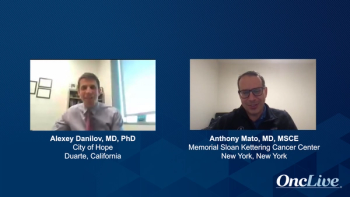
Drs Alexey Danilov and Anthony Mato highlight their preferences for diagnostic and prognostic testing when evaluating patients with chronic lymphocytic leukemia.

Your AI-Trained Oncology Knowledge Connection!


Drs Alexey Danilov and Anthony Mato highlight their preferences for diagnostic and prognostic testing when evaluating patients with chronic lymphocytic leukemia.

The types of prognostic assays used to help determine candidacy for chemoimmunotherapy as frontline treatment for chronic lymphocytic leukemia.

Recommendations for conducting imaging scans and biopsies to help guide the treatment of newly diagnosed chronic lymphocytic leukemia.

Drs Alexey Danilov and Anthony Mato recommend when hematologists and oncologists should consider repeat molecular testing for patients with chronic lymphocytic leukemia.

Drs Alexey Danilov and Anthony Mato review treatment options available for newly diagnosed chronic lymphocytic leukemia and describe decisions for monotherapy vs combination therapy.

Considerations for using novel fixed-duration regimens and triplet therapy to treat patients with chronic lymphocytic leukemia.

Circumstances for which MRD testing may be considered for patients with chronic lymphocytic leukemia.

Drs Alexey Danilov and Anthony Mato respond to a variety of questions pertaining to the assessment and treatment of patients with chronic lymphocytic leukemia.